|
|
|
Sort Order |
|
|
|
Items / Page
|
|
|
|
|
|
|
| Srl | Item |
| 1 |
ID:
129194
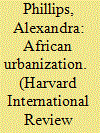

|
|
|
|
|
| Publication |
2014.
|
| Summary/Abstract |
Eko Atlantic is a city that rises "like Aphrodite from the foam of the Atlantic," wrote Nobel Prize winner Wole Soyinka. The city is defined by sustainability, luxury, technology, and economic opportunity. It is Africa's own Dubai; a gleaming gateway to the continent that will revolutionize the city of Lagos, solidifying its place as West Africa's financial center. The private development, which is located on land reclaimed from the Atlantic Ocean along
Lagos' upscale Bar Beach coastline, is predicted to house 400,000 residents and to provide over 150,000 jobs. Eko Atlantic is ushering in a wave of futuristic African cities. These modern satellite cities are built on the edge of existing metropolises in the hopes of transforming the country's economy and its role in the global marketplace. For example, developers are building Hope City outside Accra and Konza Techno City, known as "Africa's Silicon Savannah," outside Nairobi, in the hopes to turn Ghana and Kenya respectively into major players in the technology industry. African urbanization is occurring at a breakneck pace, and if done right, presents a valuable and unique opportunity to create jobs and lift millions out of poverty. However, if done wrong, the urban poor could become increasingly marginalized as slums are cleared to make way for housing they cannot afford and the mobile upper class migrates to upscale edge cities such as Eko Atlantic. Africa has the chance to urbanize in a way that increases the total populace's aggregate quality of life rather than deepening the divide between the tiny elite and the vast urban poor, but corruption and poor urban planning must first be overcome.
|
|
|
|
|
|
|
|
|
|
|
|
|
|
|
|
| 2 |
ID:
110924
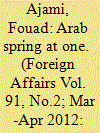

|
|
|
|
|
| Publication |
2012.
|
| Summary/Abstract |
Throughout 2011, a rhythmic chant echoed across the Arab lands: "The people want to topple the regime." It skipped borders with ease, carried in newspapers and magazines, on Twitter and Facebook, on the airwaves of al Jazeera and al Arabiya. Arab nationalism had been written off, but here, in full bloom, was what certainly looked like a pan-Arab awakening. Young people in search of political freedom and economic opportunity, weary of waking up to the same tedium day after day, rose up against their sclerotic masters.
|
|
|
|
|
|
|
|
|
|
|
|
|
|
|
|
| 3 |
ID:
086133
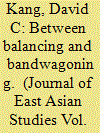

|
|
|
|
|
| Publication |
2009.
|
| Summary/Abstract |
Why has South Korea accommodated China, instead of fearing its growth and balancing against it? This article makes two central arguments. First, concepts of balancing and bandwagoning are fundamentally difficult to test, and to the extent that the theory can be tested, it appears to be wrong in the case of South Korea. In fact, we observe many cases in which rising powers are neither balanced nor "bandwagoned" but are simply accommodated with no fundamental change either way in military stance or alignment posture. Second, the factors that explain South Korean foreign policy orientation toward China are as much about interests as they are about material power. South Korea sees substantially more economic opportunity than military threat associated with China's rise; but even more importantly, South Korea evaluates China's goals as not directly threatening.
|
|
|
|
|
|
|
|
|
|
|
|
|
|
|
|
| 4 |
ID:
133474
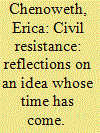

|
|
|
|
|
| Publication |
2014.
|
| Summary/Abstract |
IT HAS BEEN THREE YEARS SINCE WHY CIVIL RESISTANCE WORKS HIT THE shelves.1 When Maria J. Stephan and I sent the final galleys into the publisher, we had no idea that the Arab Spring was about to grip the world; that the Occupy movement would reenergize the protest sector in advanced
democracies; or that countries as diverse as Turkey, Venezuela, Ukraine, Thailand, and India would be rocked by nonviolent resistance against entrenched authority, lack of economic opportunity, and corruption. While many people have cataloged the global decline in armed conflict, few have noticed that, in the meantime, the use of civil resistance has been on the rise.
|
|
|
|
|
|
|
|
|
|
|
|
|
|
|
|
| 5 |
ID:
133724
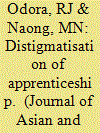

|
|
|
|
|
| Publication |
2014.
|
| Summary/Abstract |
The intention of this paper is two-fold; firstly, it is to explore the causal effect of perceived negativity towards Further Education and Training (FET) college education among South African youth. Secondly, it is to determine the impact of apprenticeship on the development of entrepreneurial knowledge and skills among FET college students. The FET sector serves a particular function, which is the imparting of hands-on vocational training, intended to inculcate and promote a culture of self-employment, considered a necessity for employment creation. A questionnaire was used to collect data from 112 randomly selected students from three Motheo FET colleges. The findings reveal very contrasting results, a direct correlation between apprenticeship and entrepreneurship; however, 53% of the respondents did not feel sufficiently equipped, ready and confident enough to start their own businesses after graduation. About 48% feel the need to further their studies at university in order to stand a better chance of landing a good job.
|
|
|
|
|
|
|
|
|
|
|
|
|
|
|
|
|
|
|
|
|